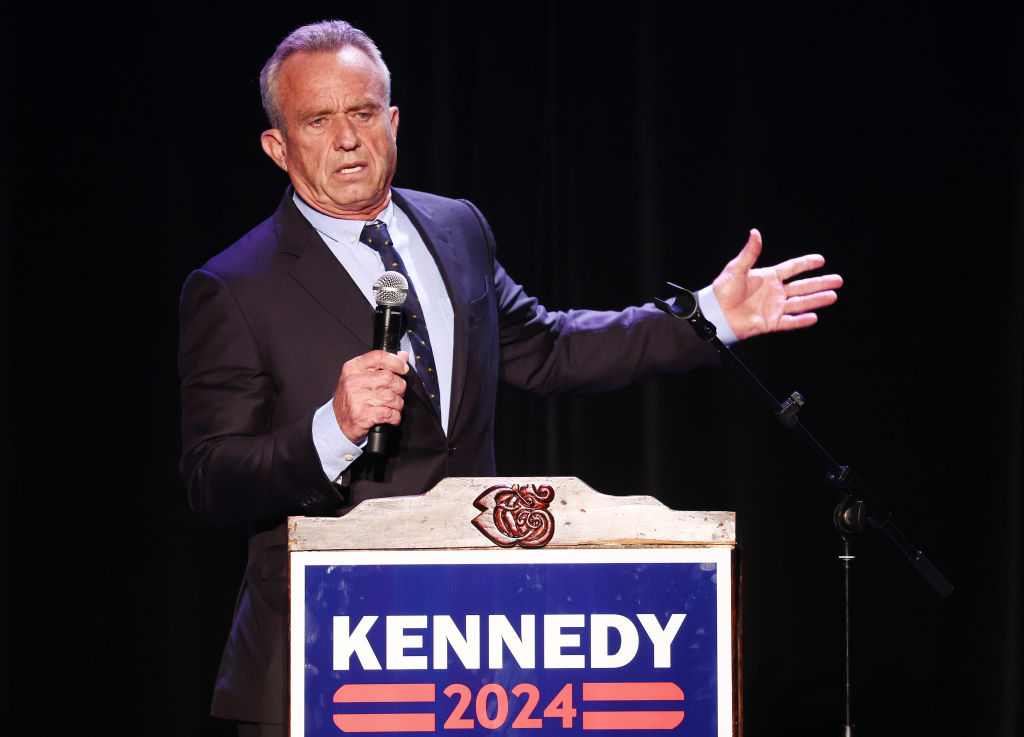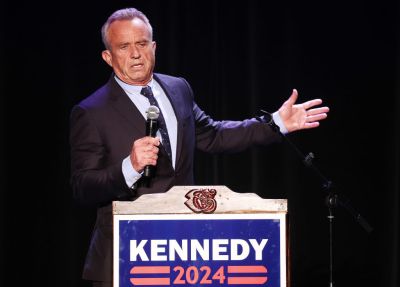Robert F. Kennedy Jr. is expected to announce next week that he is leaving the Democratic Party and taking his presidential bid elsewhere.
Where, exactly, remains unclear. But there are hints. As the folks at No Labels can attest, gaining ballot access for a new party is very hard. And at this late date, Kennedy would need help, which the struggling Libertarian Party could provide.
Kennedy met with the party’s chairwoman over the summer, and his views on vaccines, foreign policy, and allegations of criminal conspiracies inside the federal government line up well with the party’s current direction. And some of Kennedy’s funders occupy that fuzzy space between MAGA and the new-look Libertarian Party.
Kennedy’s longtime work in favor of environmental regulations—work that endeared him to many on the progressive left—or his comments about Jews and COVID might have posed a serious barrier to his nomination by the old, Randian Libertarian Party. But they don't seem like much of a stumbling block these days. “I’d vote for him in a heartbeat,” the party’s 2012 and 2016 nominee, former New Mexico Gov. Gary Johnson, told the New York Times.
In part because of Johnson’s showing in 2016, when the former Republican won more than 3 percent of the vote nationwide—about 4.5 million votes—Kennedy would have an easier path to landing on the ballot if he ran as a Libertarian. While new parties struggle to get access, most states provide accommodations for parties to retain their slots, especially when they have hit minimum thresholds of support.
If Kennedy makes the jump, he would be following the example not only of Johnson—who went Libertarian in 2012 after failing to make a dent with GOP primary voters— but also of Cornel West, the progressive activist who this year took his own independent bid to the Green Party, which itself is still benefiting from 2016. That year nominee Jill Stein managed 1.5 million votes, or about 1 percent, nationally.
It is Stein who Democrats these days are very much thinking about. Like Ralph Nader from the 2000 election, Stein holds a prominent place in the Democratic demonology. The argument goes that if not for the 132,431 votes cast for Stein in 2016 in Wisconsin, Michigan, and Pennsylvania, Hillary Clinton would have been president.
That is exactly what Democrats fear and Republicans hope would happen with West and Kennedy in the race.
“Given the razor-thin margins of Joe Biden’s 2020 victories in Arizona, Wisconsin and Georgia — less than 43,000 votes in total,” writes Paul Rosenberg in Salon, “left-wing third-party votes or abstainers could easily provide Donald Trump the edge he needs to return to the White House and enact a neo-fascist agenda.”
First, a little context on whose votes went to Stein in 2016, or might go to Kennedy and West.
No one who was voting for Stein thought they were helping to elect the next president, but all of them wanted their votes to send a message. For some, it was no doubt a sincere expression of their concern about the environment. For others, it was that they were unhappy with Clinton and the Democratic establishment.
Do we suppose that if Stein had not been running that those voters would have all voted for Clinton? I doubt even that most would have. Maybe they would have stayed home. Maybe they would have written in Sen. Bernie Sanders of Vermont.
Had they known that Trump would become president unless they voted for Clinton, many of the 132,431 Wisconsin, Michigan, and Pennsylvania Stein voters might have changed their minds. That was probably more of a message than they wanted to send. But because Clinton’s victory seemed certain, a message the Clinton campaign reinforced in one of the single worst strategic decisions on record, going for Stein seemed a low-cost way to let the Clintons and the Democratic establishment know what the folks in flyover country were thinking.
You saw the results in 2020 when Democrats not only had a better-liked candidate but were well aware of Trump’s electoral potency. The Green Party ended up with a quarter of a percent of the national vote.
If you were looking for a spoiler candidate in 2020, you’d have to look at the other side of the aisle. Libertarian nominee Jo Jorgensen didn’t do nearly as well as Johnson had in 2016. But if you flipped all the libertarian votes from Jorgensen to Trump in Wisconsin, Arizona, and Georgia, you would have had a 269-269 tie in the Electoral College, which might have been resolved in the House of Representatives in favor of a second term for Trump.
While some of the same caveats apply to those 2020 Libertarian voters as to the Stein voters in 2016, the 2020 Jorgensen voters should have been under no illusions that Trump was heavily favored to win. They voted for Jorgensen knowing that they were abandoning the party with which Libertarians have been more traditionally aligned and knowing that it might mean a Democrat was elected president.
Democrats have tended to fixate on Stein as a spoiler, but Republicans have nurtured larger, more exotic theories about how they believe Trump was robbed in 2020. There’s no doubt that under the spoiler theory of elections, however, that it was Republicans in 2020 who paid the price.
What doesn’t follow, then, is why Democrats would be anything but thrilled about the prospect of an independent run by Kennedy, particularly if he does so in league with the Libertarian Party.
Kennedy’s support already comes more from right-leaning Americans than from Democrats, and that would only intensify if he took on the Libertarian label.
Democrats are understandably nervous about their incumbent. And they should be. But Kennedy’s candidacy, which was succored by mischief-making MAGA Republicans as a spoiler in the Democratic primaries, seems very much more likely to bite the hands that fed it than to harm Biden in a rematch with Trump.







Please note that we at The Dispatch hold ourselves, our work, and our commenters to a higher standard than other places on the internet. We welcome comments that foster genuine debate or discussion—including comments critical of us or our work—but responses that include ad hominem attacks on fellow Dispatch members or are intended to stoke fear and anger may be moderated.
With your membership, you only have the ability to comment on The Morning Dispatch articles. Consider upgrading to join the conversation everywhere.